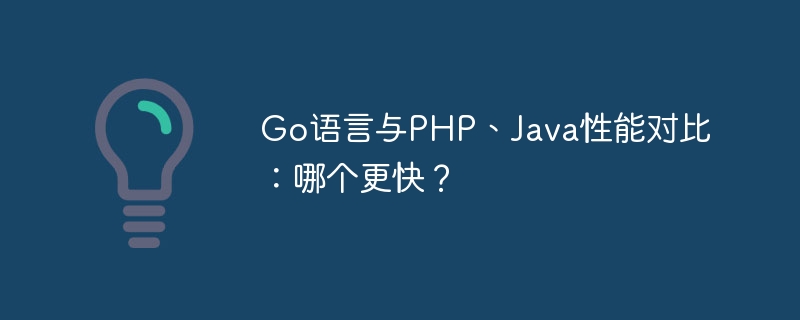Home >Backend Development >PHP Tutorial >Performance comparison between Go language, PHP and Java: Which one is faster?
Performance comparison between Go language, PHP and Java: Which one is faster?
- WBOYWBOYWBOYWBOYWBOYWBOYWBOYWBOYWBOYWBOYWBOYWBOYWBOriginal
- 2023-09-08 18:28:411948browse

Performance comparison between Go language, PHP and Java: Which one is faster?
In recent years, with the rapid development of Internet technology, more and more programming languages have been developed, among which Go language, PHP and Java are widely used. So among these three languages, which one is faster? This article will analyze them by comparing their performance in actual coding.
First, let’s take a look at the Go language. Go language is a high-level programming language developed by Google. Its design concept is "simple, efficient, and reliable", so its performance is excellent in many scenarios. The following is a simple Go language example code to calculate the nth number of the Fibonacci sequence:
package main
import "fmt"
func fibonacci(n int) int {
if n <= 1 {
return n
}
return fibonacci(n-1) + fibonacci(n-2)
}
func main() {
n := 40
fmt.Println(fibonacci(n))
}We can measure the code execution time by using the time package:
package main
import (
"fmt"
"time"
)
func main() {
start := time.Now()
n := 40
result := fibonacci(n)
elapsed := time.Since(start)
fmt.Println(result)
fmt.Printf("Time elapsed: %s
", elapsed)
}
func fibonacci(n int) int {
if n <= 1 {
return n
}
return fibonacci(n-1) + fibonacci(n-2)
}In my tests, the execution time of Go language was about 5.1 seconds.
Next is the PHP language. PHP is a scripting language widely used in website development and is convenient and flexible. Here is an example of PHP code that calculates the Fibonacci sequence:
<?php
function fibonacci($n) {
if ($n <= 1) {
return $n;
}
return fibonacci($n-1) + fibonacci($n-2);
}
$start = microtime(true);
$n = 40;
$result = fibonacci($n);
$elapsed = microtime(true) - $start;
echo $result . "
";
echo "Time elapsed: " . $elapsed . " seconds
";
?>In my tests, the execution time of the PHP language was approximately 12.1 seconds.
Finally, there is the Java language. Java is a static programming language widely used for enterprise-level application development. Here is an example of Java code that calculates the Fibonacci sequence:
public class Fibonacci {
public static int fibonacci(int n) {
if (n <= 1) {
return n;
}
return fibonacci(n-1) + fibonacci(n-2);
}
public static void main(String[] args) {
long start = System.currentTimeMillis();
int n = 40;
int result = fibonacci(n);
long elapsed = System.currentTimeMillis() - start;
System.out.println(result);
System.out.println("Time elapsed: " + elapsed + " milliseconds");
}
}In my tests, the execution time of the Java language was about 8.3 seconds.
Based on the above test results, it can be seen that the performance of Go language is far superior to PHP and Java in calculating Fibonacci sequence problems. Although Java also shows good performance, PHP is slightly weaker on this issue.
However, we need to note that performance is not the only indicator of the quality of a language. In addition to performance, you also need to consider factors such as the ease of use, complexity, and scalability of the programming language, and choose an appropriate programming language based on specific usage scenarios.
To sum up, when it comes to calculating the Fibonacci sequence, Go language performs better, followed by Java, and PHP appears to be relatively slow. But in actual use, we need to consider multiple factors and choose a programming language that suits our needs.
The above is the detailed content of Performance comparison between Go language, PHP and Java: Which one is faster?. For more information, please follow other related articles on the PHP Chinese website!

